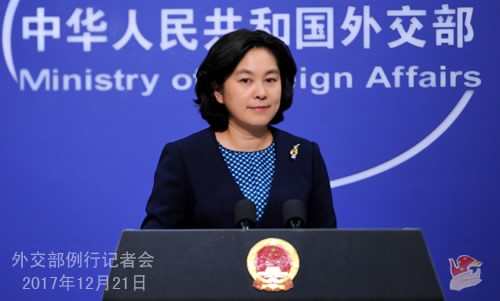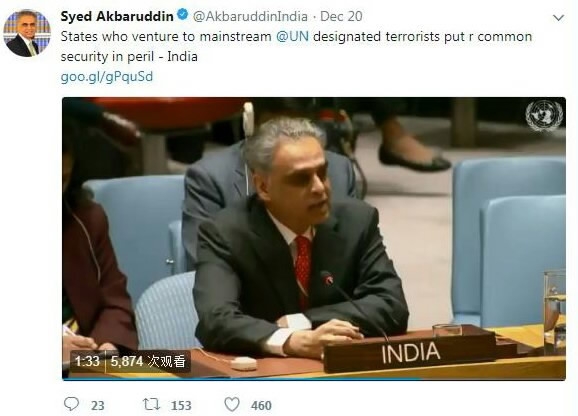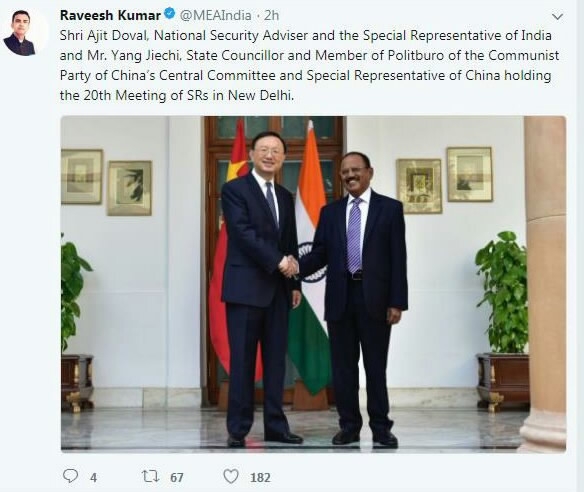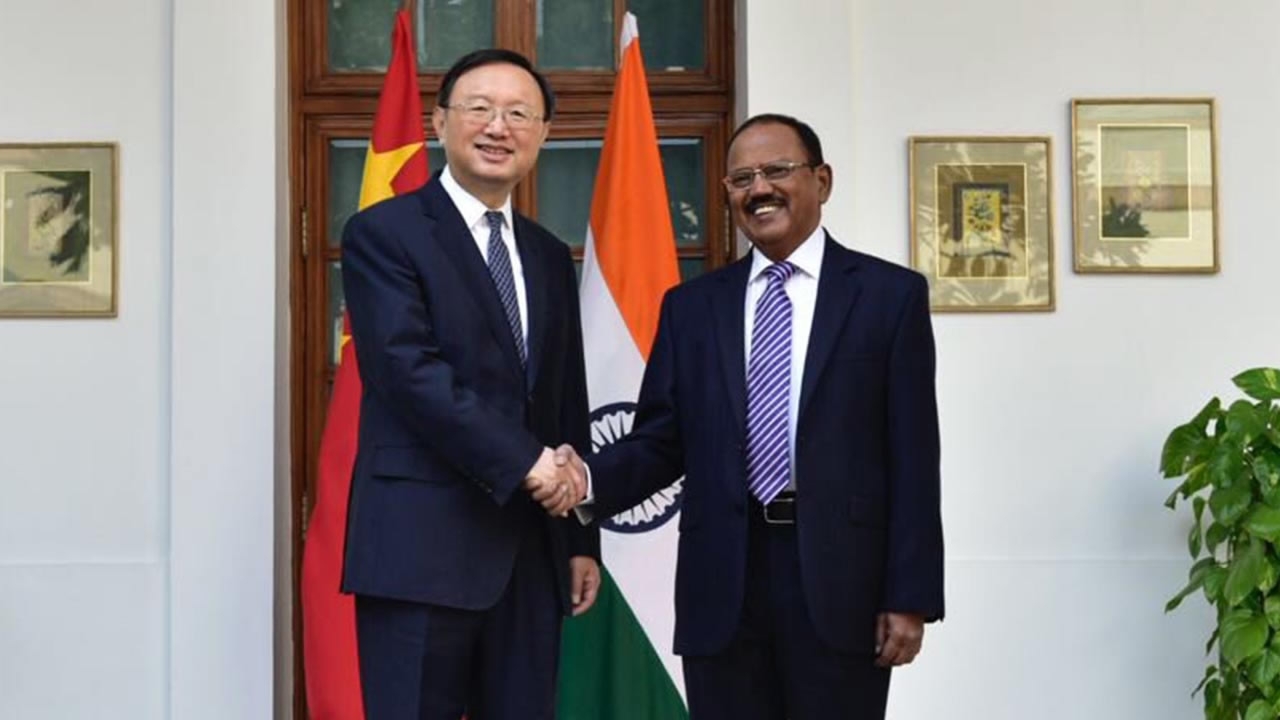China asserted on Thursday its position on fighting terrorism in all forms a day after India raised concerns at the United Nations Security Council (UNSC) that some UN members are failing to “clearly understand” the common threat of terrorism due to their “narrow political and strategic concerns,” in a veiled reference to China and Pakistan. The remarks came as
top Chinese and Indian diplomats resumed crucial border talks in New Delhi on Friday.
“The Chinese side firmly fights against all forms of terrorism and maintains that the international counter-terrorism cooperation should be stepped up. Our resolve and sincerity in this regard are beyond doubt. When it comes to the issue of counter-terrorism, the Chinese side is always making judgments and decisions based on the merits and demerits of the matter,” Foreign Ministry Spokesperson Hua Chunying told reporters on Thursday.

China's Foreign Ministry Spokesperson Hua Chunying at a press conference in Beijing, on December 21, 2017. /Photo via China's Ministry of Foreign Affairs
China's Foreign Ministry Spokesperson Hua Chunying at a press conference in Beijing, on December 21, 2017. /Photo via China's Ministry of Foreign Affairs
She added that “China's relevant actions within the 1267 Committee conform to the relevant UN Security Council resolutions and the deliberation rules of the Committee. We are willing to continue enhancing counter-terrorism and security cooperation at the UN Security Council and other platforms so as to jointly uphold the peace and security of the region and the world at large.”
“The relevant actions of China are open and aboveboard and have nothing to do with the so-called ‘narrow political concerns.’ Such kind of label can by no means be pinned on China,” Hua asserted.
India targets China, Pakistan
The Chinese Foreign Ministry statement came in response to remarks by India’s Permanent Representative to the UN Syed Akbaruddin during an open debate at the UN Security Council on Wednesday, in which he apparently referred to China’s decision of repeatedly blocking a move by India to designate Masood Azhar, chief of Pakistan-based Jaish-e-Mohammed (JeM) group, as a global terrorist under UNSC resolution 1267.

A screenshot of the Twitter post by Syed Akbaruddin, India's Permanent Representative to the UN, following his statement at the UN Security Council open debate on December 20, 2017.
A screenshot of the Twitter post by Syed Akbaruddin, India's Permanent Representative to the UN, following his statement at the UN Security Council open debate on December 20, 2017.
“It appears that this common threat [of terrorism] to states and societies is not clearly understood here. Even on counter-terrorism, cooperation continues to elude the Council. It is noticed that on an issue as serious as designation of terrorist individuals and entities, the Council-mandated Sanctions Committees fail to make concrete progress and fall victim to narrow political and strategic concerns in some cases,” the Indian envoy said during the debate on “Addressing Complex Contemporary Challenges to International Peace and Security.”
Coincidentally, Azhar’s JeM group has been officially designated as a terrorist organization under the same UNSC resolution.
“With regard to the listing of the 1267 Committee, we have stated our position many times. As the Indian side is concerned about it, we answered relevant questions patiently, earnestly and candidly every time,” Hua said.
Akbaruddin also hinted at reports that the UN-designated terrorist and alleged mastermind of 2008 Mumbai attacks, Hafiz Saeed, was seeking to contest elections in Pakistan. “In other cases where Sanctions Committees have designated terrorists, there are states who venture to mainstream UN designated terrorist individuals into their political process in total disregard of international law, thus putting our common security in peril,” he said.
Hafiz Saeed’s Jamaat-ud-Dawa (JuD) will contest the 2018 general elections in Pakistan under the banner of the Milli Muslim League, which is yet to be registered with the Election Commission, according to media reports.
Yang, Doval negotiate border issue

A screenshot of a Tweet by India's Ministry of External Affairs Spokesperson Raveesh Kumar announcing the beginning of the 20th Special Representatives' Meeting on India-China Border Questions between China's State Councilor Yang Jiechi (left) and Indian National Security Advisor Ajit Doval.
A screenshot of a Tweet by India's Ministry of External Affairs Spokesperson Raveesh Kumar announcing the beginning of the 20th Special Representatives' Meeting on India-China Border Questions between China's State Councilor Yang Jiechi (left) and Indian National Security Advisor Ajit Doval.
The diplomatic exchange of words between the Asian neighbors came as Chinese State Councilor Yang Jiechi arrived in New Delhi on Friday for border talks with India’s National Security Advisor Ajit Doval, the first since the 73-day Donglang standoff this summer.
"At the invitation of National Security Advisor Ajit Doval of India, member of the Political Bureau of the CPC Central Committee and State Councilor Yang Jiechi will travel to India to attend the [20th] Special Representatives' Meeting on the China-India Boundary Questions on December 22," Hua had confirmed on Wednesday.
The day-long talks began around 10:00 am local time on Friday. A joint statement is expected later in the evening.
The two top diplomats are expected to discuss the Donglang episode along with other matters related to unresolved boundary issues between India and China.
Yang and Doval last met in Beijing in July – at the height of the Donglang standoff – on the sidelines of the seventh meeting of BRICS senior representatives.
The mechanism of special representatives’ talks was created during India’s former Prime Minister Atal Bihari Vajpayee’s China visit in 2003. It was a significant elevation from the previous official-level joint working group meetings.
The mechanism envisioned a three-step process for resolving border issues. New Delhi and Beijing reached an agreement on guiding principles and setting political parameters for a settlement in 2005. Currently, the countries are negotiating the second phase of working out a settlement framework, which will be followed by the final step of drawing a border line based on the framework agreement.
The Asian neighbors have so far held 19 rounds of special representatives’ talks in 14 years, the last of which was held in Beijing in April 2016, also led by the duo of Yang and Doval.
Friday's talks in New Delhi will continue from the 10th round of the Working Mechanism for Consultation and Coordination on India-China Border Affairs (WMCC), initiated in 2012 to maintain peace along the disputed border, held in Beijing in November.
The high-level meeting also comes just days after Chinese Foreign Minister Wang Yi visited India earlier this month as part of the trilateral Russia-India-China (RIC) meeting. On the sidelines of the event, Wang held talks with his Indian counterpart Sushma Swaraj and also met with Indian President Ram Nath Kovind.





